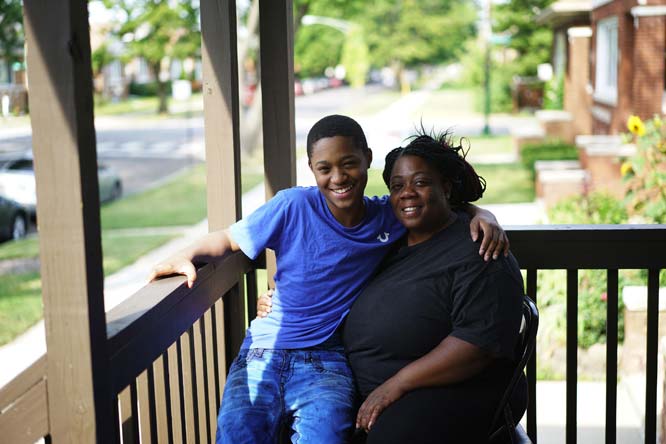 Tavon Tanner and his mother Melanie Washington at home. Jason Wambsgans/Chicago Tribune
Tavon Tanner and his mother Melanie Washington at home. Jason Wambsgans/Chicago Tribune
Tanner walked outside, onto his front porch and into the summer morning.
"See?" he said.
It was Tuesday, the heat just beginning to rise, and he looked out toward the bungalows, the flowers and the clean sidewalks.
"The neighborhood is quiet here. You can hear the birds."
No sirens, no shouting, no loud music, no gunshots.
No fear.
The scariest thing in this neighborhood is the rabbits.
Except for the fact that it's an old, wooden porch, up a flight of stairs, Tavon's front porch on the Northwest Side is nothing like the porch where he was shot on a summer night two years ago.
When the shots came from out of nowhere, aimed at who knows whom, a bullet hit Tavon near the base of his spine. He spent weeks in the hospital, where for a while it was uncertain whether he would live.
He survived, and last year, on the first anniversary of the shooting, his family was inspired to throw an anniversary celebration. This year, he said he didn't want a party, but wouldn't mind getting some new video games.
"It don't hold me back no more," he said. "I don't like to go back in the past no more. I like to go forward."
We were sitting at a card table in the living room of the two-story rented house where Tavon lives with his twin sister, an older sister, a younger brother and his mother,
They got the house with the help of a
The man gave her a car, too, a 1994 white Lexus, so she could drive her kids around and wouldn't have to spend so many hours getting to and from her job at a
In some ways, Tavon's life, and his family's, is better than before the shooting. The new neighborhood isn't fancy, but it has parks and pools and friendly people of all kinds.
"Some of everything," Washington said, citing Poles, Mexicans, a few other African-Americans.
"And up here they do everything we used to do as a kid," she said, meaning play volleyball, have pogo stick races, jump rope, the kind of old-fashioned recreation she says has vanished from much of the West Side.
As for Tavon, he's 12 now, taller than his mother. The physical damage from the bullet has mostly healed. The long abdominal scar from the surgery after he was shot remains, but his shirt hides it.
"It'll probably disappear, as much as he eats," Washington said. She laughed. "He's gobbling everything."
Tavon buried his head in his hands, but he was smiling.
Sometimes, still, Tavon hesitates before going out on the porch, but he's no longer afraid to be outside alone.
"I can walk to the store by myself now," he said. "No guns around. Don't have to look over your head to make sure nobody's behind you."
Earlier this summer, two
"It's like God took my powers away," he said. "Then I started eating a lot and God gave me my powers back."
And yet the shooting remains part of Tavon's life. Damage and danger linger.
Every Thursday, Washington takes the day off from her job to drive him to counseling at
On Tuesday, Tavon smiled easily and talked more freely than he did for a while after he was shot, but he still struggles.
Toward the end of the last school year, his mother said, he was severely depressed.
"He was being bullied," she said.
"Not bullied," Tavon replied. "We was being threatened."
With the help of school officials and the police, that situation seems to have resolved, but school will soon resume and school is in a dangerous neighborhood.
Right after the shooting, Washington moved her family into an aunt's house in
The school was good. The kids had friends. They needed some stability.
She valued the fact that the school's staff understood what Tavon has endured. They've helped him catch up on the schoolwork he missed during his eight surgeries. They're helping him this summer. Keeping the kids at that school has another advantage too. In the afternoons, while Washington is still at work, on the
But in that part of
Four people had been shot on the block, a fact that merited only a few lines in the news reports on another bloody
"Something told me not to take him over there," Washington said. "He's already been traumatized."
At least 74 people were shot in
Tavon and his family live 9 miles from where he was shot on that August night two years ago. In some ways it feels like 900.
But even in the new place, violence creeps in. Sitting in their safe home, Tavon and his family watch the news. On the screen, they see places they recognize and people they know. They watch the grieving and the weeping and remember when they were the people on the screen.
"When my mother says, 'Come to the West Side,' I make it snappy," Washington said Tuesday. "It's so crazy. You can look up and in two seconds you're gone."
She was leaning on the porch railing, next to her son, listening to the quiet.
"I love being home."
A while later I emailed the
"No offender in custody. The investigation continues."
Previously:
• 07/26/18: An everyday encounter made brighter by a good question: 'Do you have a story for me?'
• 06/19/18: A Big Sister's Guide to Life: Don't chase men and other practical advice
• 06/12/18: For 13 years, 2 friends wrote letters daily. It was a love affair of poetry, separated only by death.
• 06/01/18: What would we do without our brothers?
• 05/17/18: Forget a fiddler. City woman awakens to find a goose on her roof --- and laws about removing it and her eggs
• 05/10/18: A high school senior with college dreams was paralyzed by gunfire. Two years later, he's still pushing forward
• 04/05/18: Remembering the youngest history makers
• 04/03/18: The Parable of the (Expletive Deleted) Comfort Dog
• 02/15/18: Fees, fines, loans, scams: How the poor get poorer
• 02/01/18: When Paul Simon, Daniel Day-Lewis and Elton John say 'farewell' to work they love, should we too?
• 01/25/18: At Oscars time, let's snub the snubbing
• 12/28/17: The real 2017 word of the year
• 12/20/17: The laundry-folding robots are coming
• 12/13/17: How not to waste the last days of 2017


 Contact The Editor
Contact The Editor
 Articles By This Author
Articles By This Author